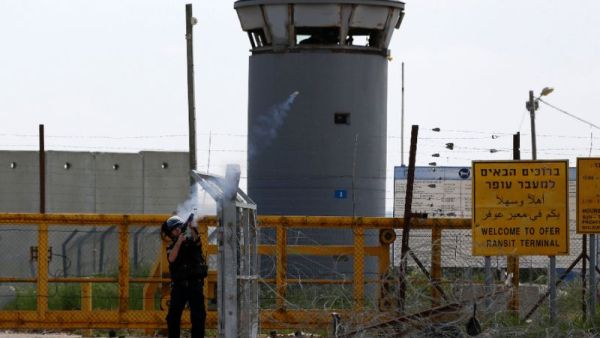Nearly a week into the the hunger strike of six Palestinians who have been held in custody by the Palestinian Authority (PA) for five months without charge or explanation, demonstrators gathered in Ramallah on Saturday demanding the prisoners’ immediate release.
The protests came as reports continued to emerge of the torture and mistreatment of the six detainees.
Criticism has also mounted that the case marked yet another escalation of the PA’s “security coordination” with Israel through what critics have called a “revolving door policy" of funneling Palestinians from PA jails into Israeli prisons -- criticism that most recently surged after Palestinian police detained and beat to death a senior leader of the Fatah movement's military wing.
Dozens of Palestinians protested outside of the Palestinian security and presidential compound (the Muqata) Saturday afternoon, shouting the names of the six detainees who have been on hunger strike since Sunday, and waved posters demanding the release of the six "abductees.”
Palestinian security officers prevented the protesters from entering the Muqata premises, and videos shared on social media showed Palestinian police vehicles parked in front of the demonstrators attempting to drown out anti-PA chants by blaring their sirens.
PA accused of ‘security coordination’ with Israel over ‘illegal’ detentions
Basil al-Araj, 33, Mohammed Harb, 23, Haitham Siyaj, 29, Mohammed al-Salamen, 19, Ali Dar al-Sheikh, 21, and Seif al-Idrissi, 26, have all been held by the PA’s intelligence agencies since late March and early April 2016.
Al-Araj, Harb, and al-Siyaj were detained on April 10 while walking near Ramallah, after the three had been reported missing by their families for ten days.
While initial reports said the three would simply be questioned by PA security before being returned to their families, PA police later revealed they had been found with weapons, hand grenades, and camping equipment, allegedly to be used in a future attack on Israel.
The Hamas movement quickly responded to the incident, accusing the PA of “cooperation with the Israeli occupation” in the detention of three “resistance fighters.”
According to Palestinian prisoner solidarity network Samidoun, the three others, al-Salamen, Dar al-Sheikh, and Idrissi was detained around the same time period.
Samidoun said the young men were all "well-known in their communities and families for their commitment to Palestinian freedom. Their arrest, torture, and continued imprisonment clearly comes under the auspices of Palestinian Authority ‘security coordination’ with Israel.”
Just over a week before police detained the first three, Palestinian President Mahmoud Abbas pledged in an interview with Israel’s Channel 2 to arrest Palestinians planning attacks targeting Israel.
Shortly after their detention, in an interview with Der Spiegel, Abbas said: “Our security forces are working very efficiently to prevent terror. Just a couple of days ago, three young men were tracked down and arrested. They were planning an attack. In this context, our security cooperation with Israel is functioning well.”
The PA has long been criticized for their security collaboration with Israel, criticism that took on a new significance after the police beating last month that killed Ahmad Halaweh, as Israel too has been the target of widespread international condemnation for unlawful killings of Palestinians since a wave of unrest swept across the Palestinian territory last October.
Meanwhile, Israel’s policy of administratively detaining Palestinians without charge or trial under undisclosed evidence has been condemned by international bodies and rights groups for years. However as the Geneva-based NGO Euro-Mediterranean Human Rights Monitor pointed out in a statement on Friday, such a policy is illegal under Palestinian law.
A Palestinian court extended the remand of the six detainees three times since May under the pretext that investigations were still ongoing. The court refused to release them under any circumstances saying that releasing them would harm public security, echoing Israel’s justification for administrative detention.
Meanwhile, Palestinian security services have said they detained the young men to “protect them from detention by Israeli forces,” according to the Euro-Mediterranean Human Rights Monitor.
The group' statement said that the detainees’ families rejected the justifications given by PA security: “If they really want to protect them, why are they being tortured, detained under poor conditions, and denied family visits?”
Euro-Mediterranean Monitor spokesperson Sandra Owen was quoted as saying that the ongoing detention of the six by the PA without charges “is a clear violation of international conventions and practices.”
She also noted the detentions were in contravention of Article 11 of the Palestinian basic law that dictates that “no one can be arrested, inspected, jailed or deprived of any of his freedoms or prevented from free movement without a court order.”
Allegations of torture
Euro-Mediterranean Monitor’s statement also reported the six had been “severely tortured” and mistreated by officers in Beitunia detention center, where they have been held.
The statement said that all were placed in solitary confinement and threatened by PA forces upon their initial detention, “to force them to admit to charges they know nothing about.”
After the announcement of their hunger strike on Sunday, the detention conditions deteriorated and became “inadequate for human living,” their families said.
Some of the detainees suffer from medical issues -- Araj suffers from kidney stones and diabetes, while al-Idrissi has a heart condition.
Their families told the NGO that despite the fact that PA security services were aware of the health problems, they have been denied treatment while being “tortured repeatedly.”
A statement made on social media by Palestinian journalist Tariq Yousif said he visited the prisoners with one of the lawyers representing the detainees, Anas Barghouthi of Palestinian prisoners’ rights group Addameer.
Yousif described the conditions of the detainees: al-Sheikh was put in a 1X1.5 meter cell without a blanket, a chair, or a mattress. Salamen and Siyaj were put together in an empty, foul-smelling 2X1.5 meter cell furnished only by a squat toilet. Al-Idrissei and Harb were put together in a similar cell. Basil was placed in 2X3 cell by himself.
The detainees told Yousif and Barghouti that the prison administration gives them each a sponge mattress without sheets from midnight to 8 a.m. "There is no room in the cell for two mattresses, because one of them must be placed on the toilet, so we sleep sitting," they said.
Addameer first released a statement on the torture of the detainees in April, following the first extension of their remand, saying they were “subjected to different forms of ill-treatment, including sitting in stress positions, sleep deprivation, continued interrogation, beating all over the body, insults, and denial of using bathroom.”
Addameer also reported the detainees had been denied access to attorney visits since their arrest, despite having previous confirmation to the attorney that he would be able to enter.
“Addameer considers the actions of the Palestinian security forces to be in contravention with the International Covenant on Civil and Political Rights (ICCPR) as well as the Convention Against Torture (CAT), both of which the Palestinian Authority is a party.”
The group added that “the Palestinian Authority must comply with the conventions to which it is a party, especially considering the ongoing deteriorating human rights situation in the occupied territories.”
By Lily Leach









